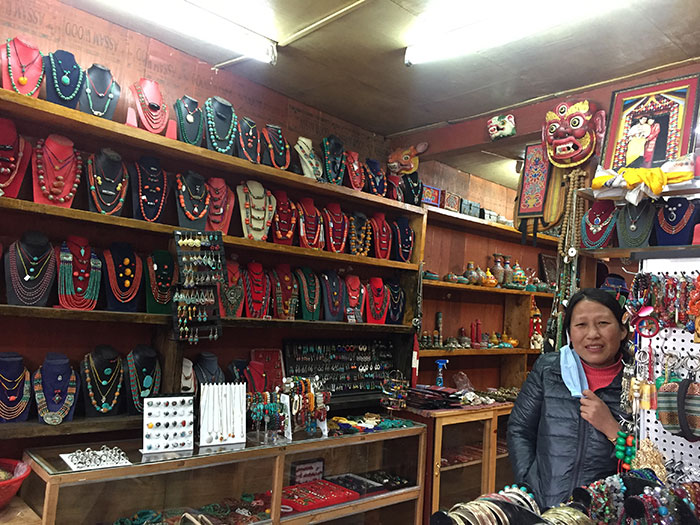Phub Dem | Paro
The tourism industry is feeling the brunt of the covid-19 crisis and the effects are spreading to small scale industry including handicraft shops, local producers and community service providers like Horse Contractors Association (HCA).
Ponies and handicraft stalls which usually hover over the base of a famous tourist hotspot Taktsang, at this time of the year, is empty today.
Usually a busy street, Paro town wears a deserted look now.
There are 69 handicraft shops in Paro.
According to the executive director of Handicrafts Association of Bhutan (HAB), Chorten Dorji, 90 percent of the shops were closed since March 2.
He, however, said the impact of Covid-19 was felt immediately after its outbreak in China.
He said that the sales dropped by 96.25 percent. “The employees were worried about their monthly salary because most of them were send on unpaid leave.”
HAB compiled an economic impact report under the tourism stimulus package.
The report stated that 95 percent of the shops are operating from rented house and almost 50 percent of the shops have a loan.
A handicraft shop owner in Paro town, Tashi Wangmo, said she opened her shop earlier this week after closing it for two weeks.
The 45-year-old woman, who has been in the business for the last 14 years, said she was expecting to earn some income to take care of her groceries.
As the sole bread earner in a family of six, she said if she continued to stay at home without doing anything, there was no one to take care of the family’s monthly expenditure such as rents and loans.
She has to pay Nu 95,500 as rent for two handicraft shops, a hotel, and her rented home.
Tashi Wangmo said that her savings from the peak season could only cover the expenditure up to April. “What if I can’t pay the rents on time? I can’t afford to lose my shop. I am worried.”
Last year, she earned Nu 70,000 during tsechu. And peak season left her with a net profit of Nu 300,000.
Tashi Wangmo said she is going around the village to sell necklaces and incense sticks.
There are 185 handicraft shops in four dzongkhags of Thimphu, Paro, Punakha, and Bumthang with 526 employees.
The owner of Heritage Handicraft, Tenzin Yeshi, said he had to close his shops a week ago and sent 14 employees on unpaid leave.
Excluding loan repayment, he has to pay Nu 170,000 a month for rent and salary. “I tried exploring alternatives. But there isn’t anything we can do because our business solely depends on tourists,” he said.
Home-based handicraft product suppliers are also affected. There are 190 handicraft producers in the country. The producers include home-based craftsmen, contract weavers, and tailors.
Meanwhile, the members of HCA that provide pony riding services to the tourists in Paro are returning to their farms.
According to the chairman of the HCA, Tshering Phuntsho, the pony services were discontinued after the first positive case in the country.
Although the members’ only source of income was providing pony services, he said that without the business, the members were leasing lands and have started working in fields.
There are 35 members in the association.
Plans
During the layoff period, HAB with support from Tourism Council of Bhutan would emphasise on reskilling and upgrading skills in innovative souvenir designing which is expected to reduce the import of handicraft products in the future.
The plan also includes reskilling of handicraft vendors in Taktsang base, Pele-la and handicraft shops in Thimphu and Punakha that are currently dealing with imported crafts.
The interim activity includes an inventory of authentic Bhutanese handicraft product in three dzongkhags-Thimphu, Paro and Trongsa, sales management and basic bookkeeping training, conduct market analysis and prepare integration of the craft sector into the tourism market.
HAB proposed a total budget of Nu 17.98 for the lay off period to provide alternative sources of income for the craft sector.
What can the government do?
HAB recommended the government and the central bank to defer loan repayment of handicraft shops and producers without interest or penalty until the market returns to normal.
It also proposed the government to look into possibilities of reducing or extending monthly rent for those who lost their business and jobs by deferring the loan repayment of landlords.
It also stated that the government should waive off monthly rental of Authentic Bhutanese crafts vendors, and proposed that the Ministry of Labour and Human Resources to employ those workers who were sent on unpaid leave through relevant schemes.


